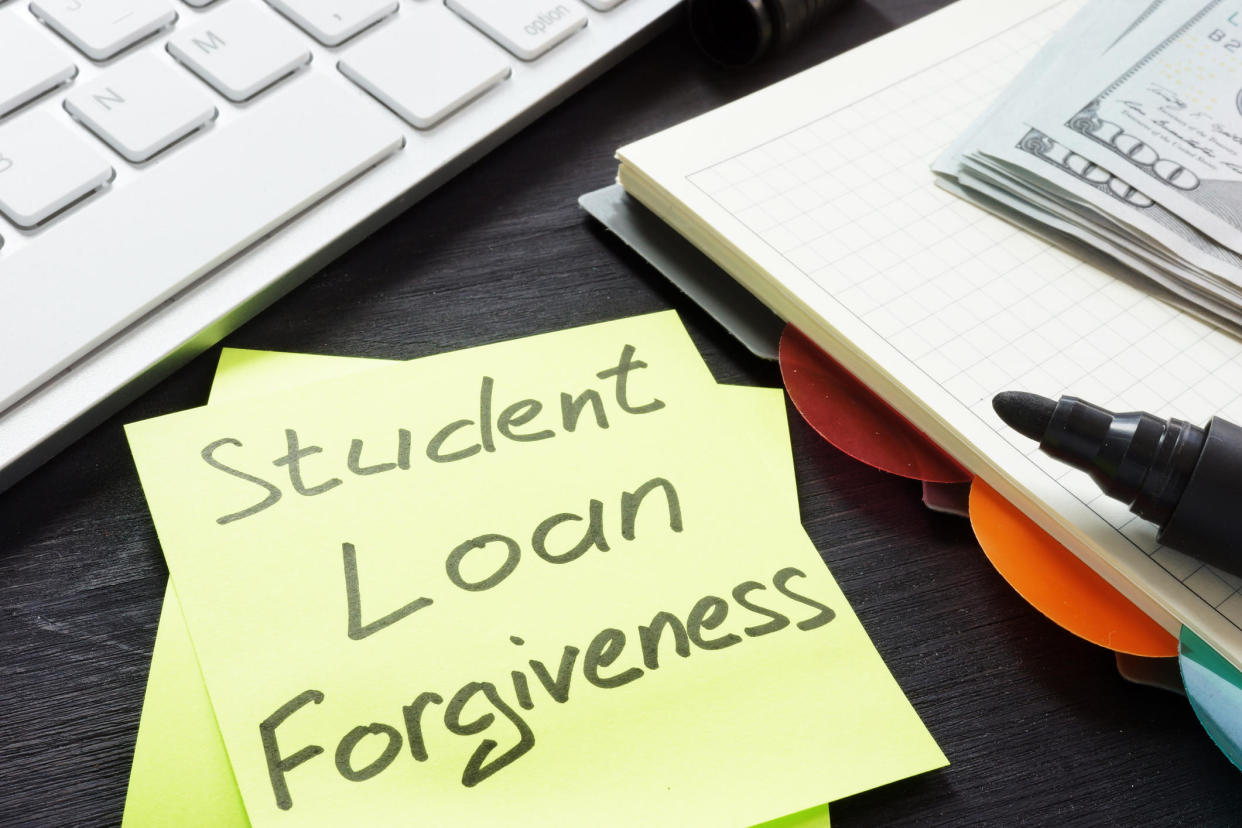These student loans are not eligible for forgiveness
- Oops!Something went wrong.Please try again later.

Millions of federal student loan holders have an opportunity to get relief with President Biden's forgiveness plan to cancel $10,000 – possibly even more for some low-income borrowers – in student loan debt per borrower.
Mr. Biden said he's keeping his "campaign promise" to "give working and middle-class families breathing room" before the federal student loan payment moratorium ends in January 2023. It may not be the $50,000 some Democrats requested, but it still helps a large portion of the 43 million federal student loan borrowers who collectively owe more than $1.7 trillion.
While this plan doesn't apply to private student loan borrowers, there are still options for them to get some help. Check out a private lender to view your options and learn how you can save money.
Who qualifies for student loan forgiveness?What student loans are not eligible for forgiveness?
Private student loans, by definition, are private and are not eligible to be forgiven. These are loans the borrower owes to student loan providers and not the federal government. Mr. Biden's plan won't change how these are repaid and borrowers should expect to continue to repay them as they have to date.
While it's theoretically possible that the government could pay private lenders individually and thus erase the debt borrowers have with those providers, this was not something that Mr. Biden announced, offered or even seriously suggested.
In short: If you have student loan debt, in any amount, that's owed to a private lender then this news won't be applicable to you.
What to do if you don't qualify for student loan forgiveness
If the debt is significant and you're having trouble paying it, you do have options. Refinancing a private student loan has multiple advantages and it should be pursued immediately if the alternative is default.
See what kind of student loan refinance options you qualify for and get relief today.
With a student loan refinance, you're essentially consolidating your private or federal student loans into a new loan (hopefully with a lower interest rate). However, you should try to avoid doing this with federal student loans, as you'll lose all of the perks and benefits that come with them, including eligibility for Mr. Biden's forgiveness program.
Pros of refinancing student loans
There are several advantages of a student loan refi if you're a private student loan borrower, including:
Possibility of lower interest ratesStudent loan consolidationAbility to change or remove a cosigner(s)Potential savings over the life of the loan
This list is not exhaustive and fees, rates and offerings vary by lender, so make sure you do your research. Compare student loan refi offerings now.
Cons of refinancing student loans
While refinancing your student loan can have several benefits (if you get the right loan), there are some possible downsides:
Not everyone is eligible for a student loan refiYou're not guaranteed a lower interest rate (it depends on your credit score and overall financial health)You may only be able to choose a variable interest rate instead of a fixed rate (which means rates can change)It may extend the life of your loan (if you choose a longer plan)
In addition to these points, you'd have even more disadvantages if you're choosing to refinance a federal student loan into a private student loan. As mentioned above, you'd lose benefits and protections such as eligibility for student loan forgiveness, income-driven repayment plans, principal rebates and more. Think long and hard before making any moves with a federal loan.
How to know if you qualify for student loan forgiveness
Here's a simple checklist that can help you determine if you qualify for student loan forgiveness under Biden's new plan:
You have a federal student loanYou earn less than $125,000 a year or your household earns less than $250,000 a yearYou qualify for a Pell Grant
Under Mr. Biden's student loan forgiveness plan, millions of borrowers would receive $10,000 in forgiveness – and some low-income Americans who qualified for Pell Grants could get an additional $10,000. (Note: Your relief will be capped at the total of your outstanding debt, so you will not get to keep any extra money if you have less than $10,000 left on the loan.)
"No high-income individual or high-income household in the top 5% of incomes, by the way, will benefit from this action, period," Mr. Biden said.
According to Mr. Biden, 27 million people will get $20,000 in debt relief, and 20 million people will have student debt fully canceled under this new program.
Those who qualify can now apply for forgiveness via an online federal application.
Other student loan forgiveness plans
If you don't qualify for Mr. Biden's forgiveness plan, you may also want to research some other student loan forgiveness programs:
Teacher Loan Forgiveness: For full-time teachers who have worked five complete and consecutive years in certain schools or services that serve low-income students.Public Service Loan Forgiveness (PSLF): For full-time government or non-profit workers who have made at least 10 years' worth of payments (120 qualifying payments). Income-Driven Repayment (IDR) Plans: For those who repay loans under an income-specific repayment program. The Biden administration is proposing new rules to make this plan more inclusive and to help lower monthly payments (learn more).Military Service: For eligible members of the U.S. armed forces (learn more).AmeriCorps: For those who successfully finished an approved AmeriCorps program.
IRS announces adjustments in response to inflation
UK Prime Minister Liz Truss faces pressure to resign as economic concerns mount

